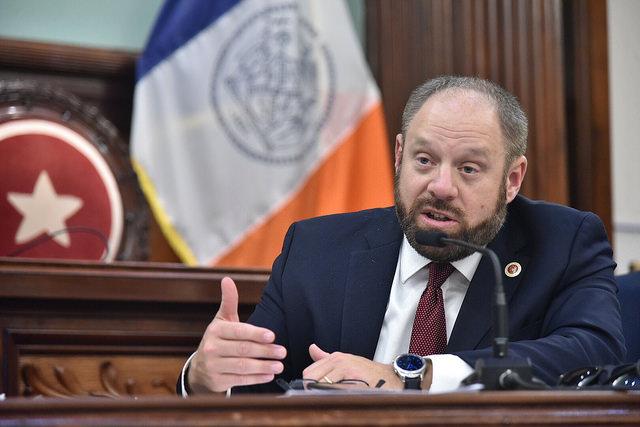Rory Lancman Wants to be the ‘Larry Krasner of Queens’—and Says He Can Prove It
The City Council member now eyeing a run for Queens DA has a record of supporting reform, but some critics aren’t convinced.

Despite its sizable population of over 2.3 million people, Queens until recently existed off the national political radar. But Alexandria Ocasio-Cortez’s upset victory over Congressman Joe Crowley, the Democratic Party boss of Queens, has placed a spotlight on the shifting demographics of the New York City borough.
As next year’s race for district attorney in Queens begins to take shape, one likely candidate, City Council Member Rory Lancman, is positioning himself as a counterpart to Philadelphia’s Larry Krasner, the progressive criminal justice version of Ocasio-Cortez.
Whether Lancman can match Krasner’s credentials is an open question. But what’s not in dispute is that Queens is wide-open terrain for reform. District Attorney Richard Brown, who turns 86 this fall, has held the office since 1991. His name is rarely mentioned in any discussion of criminal justice innovation.
“There is a growing national movement for prosecutor accountability, and it’s coming to Queens,” said Nick Encalada-Malinowski of VOCAL-NY, a statewide activist organization. Brown, he says, has long been “way out of step with progressive reform, from his resistance to ending the Rockefeller drug laws to his opposition to closing Rikers.”
Brown is also one of the leading opponents of prosecutor accountability in New York State. In June, he urged Governor Andrew Cuomo to veto a pending bill that would establish a commission to address patterns of prosecutorial misconduct that lead to wrongful convictions. Brown was first appointed to the DA’s office by Cuomo’s father Mario (to fill a vacancy), meaning his word may carry added weight with the governor.
Veteran defense lawyers point out that Queens is also the only one of the five New York City DA offices that has yet to approve or launch a conviction review unit, which Brown steadfastly opposes. Conviction review units (sometimes known as conviction integrity units) have popped up around the country to prevent and address false convictions. While their record is mixed at best, they are generally seen as a step toward reform.
Rita Dave, who has handled exoneration cases across the city, says that Queens “is in desperate need of an independent CRU. A vast number [of wrongful conviction] cases have already been identified, leading to reversals and/or exonerations based on prosecutorial misconduct.” Ron Kuby, a prominent defense attorney who has fought to overturn convictions by Brown’s office, acidly notes that the next Queens DA “will need to recognize some of the advances made in criminal justice over the last 100 years.” Brown’s spokesperson declined to comment.
Lancman supports both the bill creating the prosecutorial misconduct commission and the creation of a conviction review unit in Queens. He also has a strong track record as an elected official on both issues. As a member of the State Assembly, he called attention to the problem of criminal cases based on coerced confessions. And in 2016, as chair of the New York City Council’s courts committee, he held a hearing addressing the problem of wrongful convictions in the five boroughs.
Lancman says that he would follow Krasner’s example by bringing in someone from outside the office to run the unit. “There needs to be distance between oversight figures and the prosecutors who have been in the office for many years,” he says. Brooklyn far and away has the most active conviction review unit in the city, with 24 exonerations since 2014 under the late DA Ken Thompson and his successor, current DA Eric Gonzalez. However, the unit is run by Mark Hale, a 35-year veteran of the office, making internal politics a stumbling block in some cases.
As council member from central Queens since 2014, Lancman has been a leading supporter of many criminal justice reform issues, including closing Rikers, ending marijuana arrests, and scaling down penalties for low-level crimes. Despite his position on Rikers, the city’s corrections union has continued to support Lancman, giving him the maximum allowed donation in his 2013 and 2017 campaigns. According to Lancman, his “commitment to closing Rikers is driven in part by my commitment to keeping corrections officers safe, and [the union] appreciates that even if they don’t agree with me on closing Rikers itself.”
Still, the contributions may raise eyebrows among criminal justice reform advocates, who are already troubled by Lancman’s 2015 support as a council member for adding 1,300 new NYPD officers during a period when crime rates have been consistently dropping in the city. There was near-unanimity between the progressive City Council and Mayor de Blasio on the issue, but critics still questioned the move. Lancman says he has “no regrets, because the new cops were needed to establish ‘neighborhood policing.’” The added community outreach by officers is popular among business owners on Jamaica Avenue, Lancman notes, though he acknowledges that neighborhood policing often leads to more “broken windows” enforcement of low-level crimes.
Some advocates are also concerned that Lancman’s strident opposition to the Boycott, Divestment, Sanctions (BDS) movement, which is critical of Israel, could lead to crackdowns on activism. He has described BDS as “hate speech” and “illegal.” Nevertheless, Lancman insists that Queens residents “can count on me to protect views I disagree with,” and says that he has worked closely with the sizable Muslim population (many Bangladeshi) in his district.
Whereas Krasner offered the experience of a seasoned defense attorney, Lancman would carry the baggage of an elected official into the DA’s race. There are still 13 months until the September 2019 primary, and it’s possible that another candidate may run to the left of Lancman; others will most likely run to his right. But given that Richard Brown has run unopposed since 1991, the presence of multiple challengers in the race for DA would be a welcome change in Queens.
